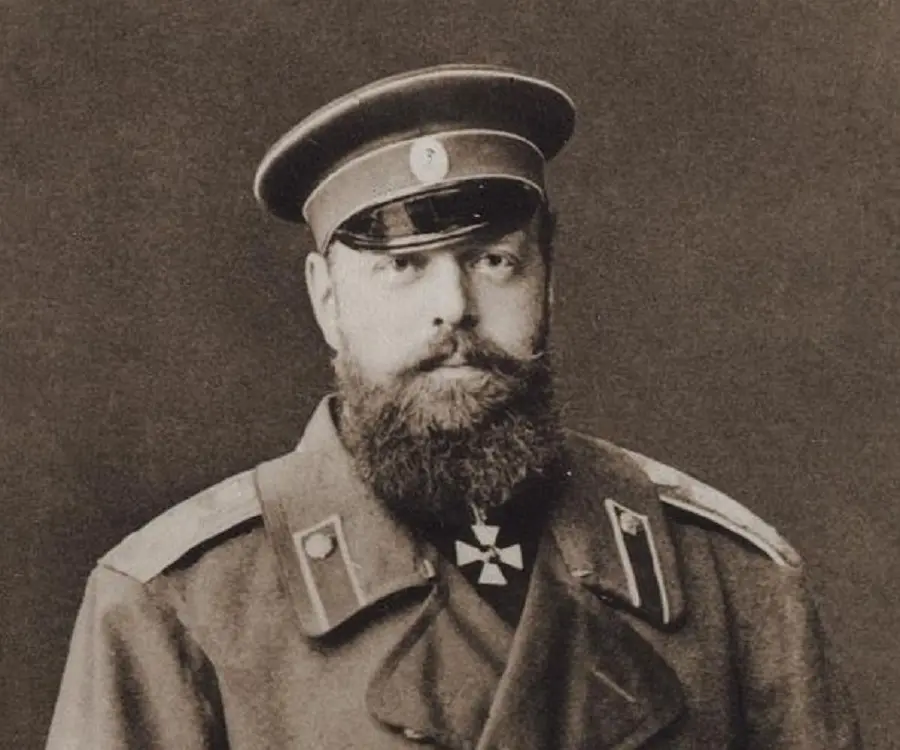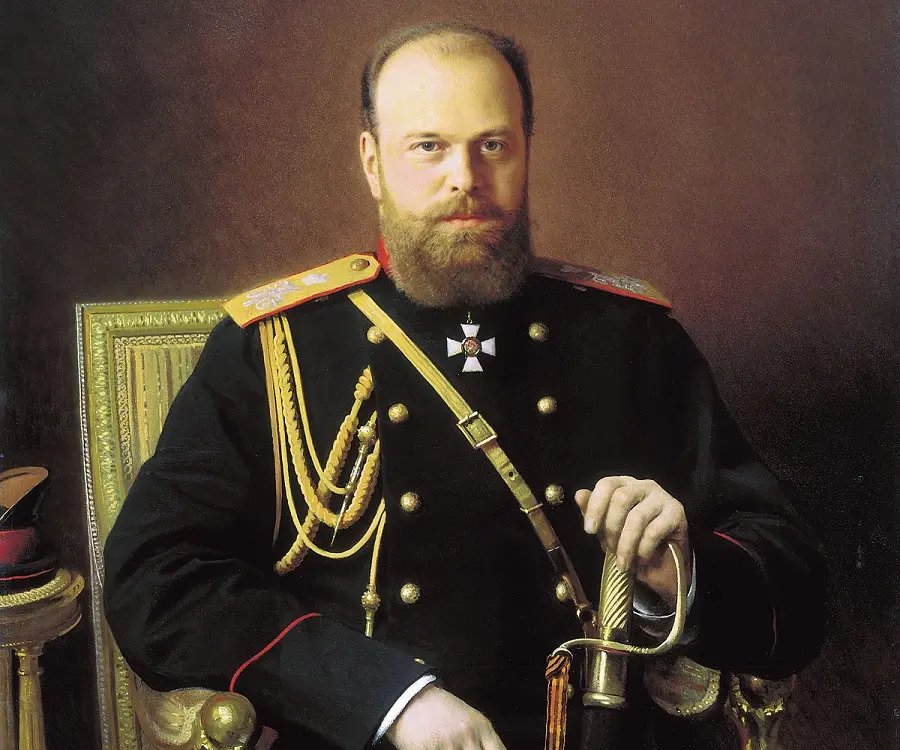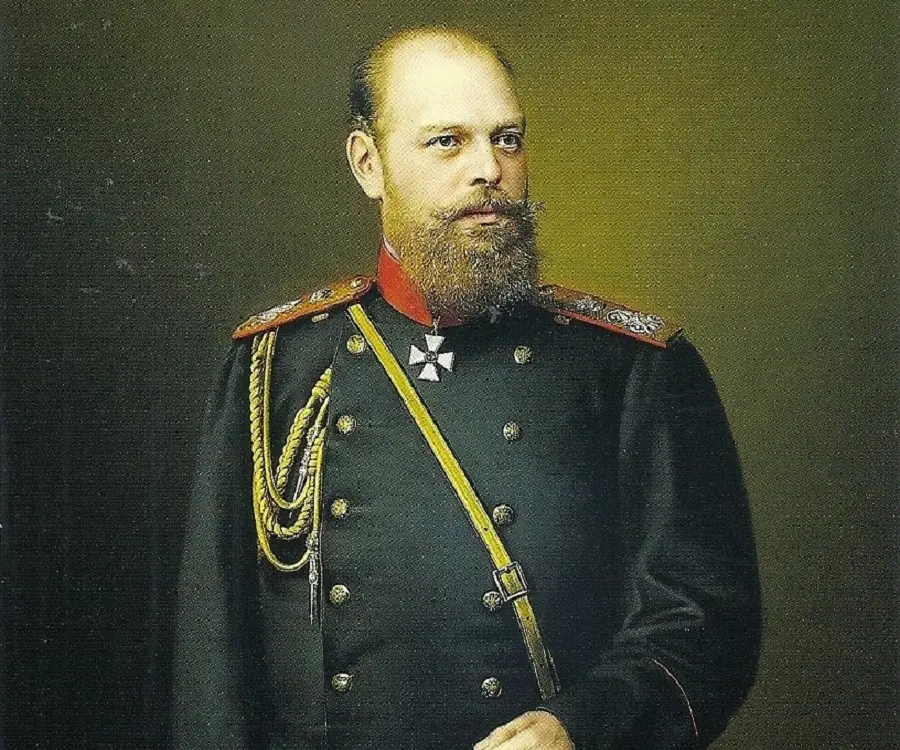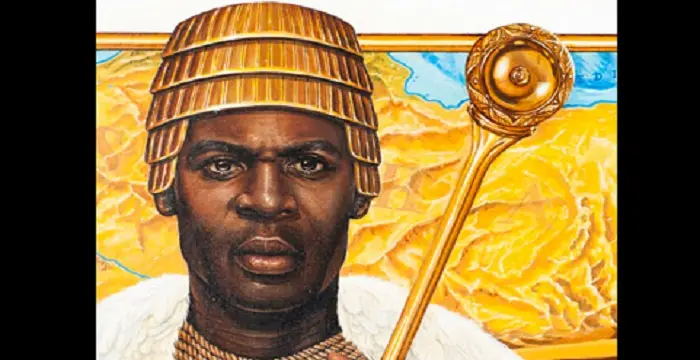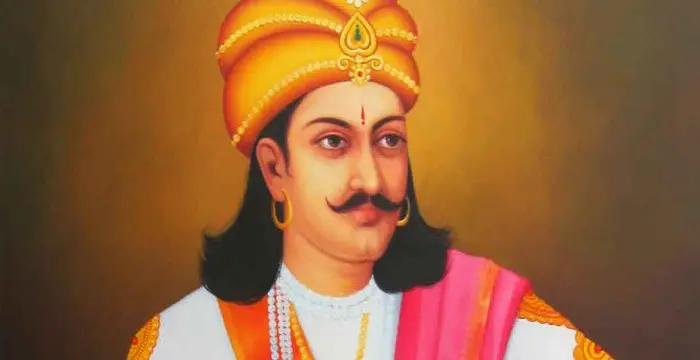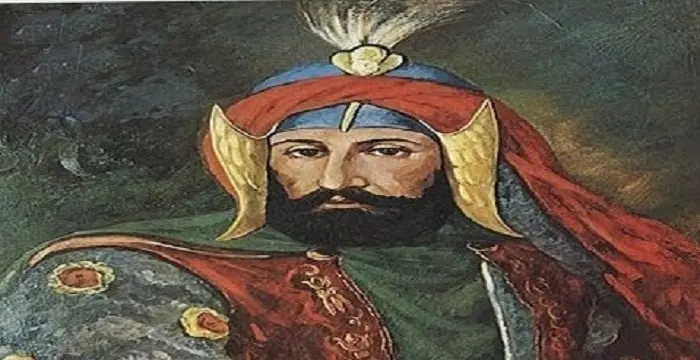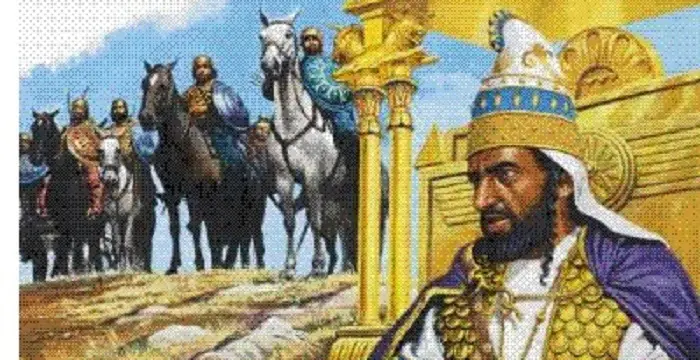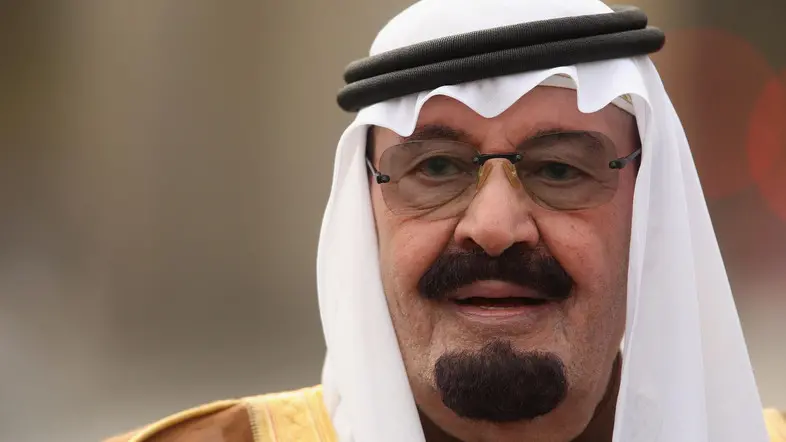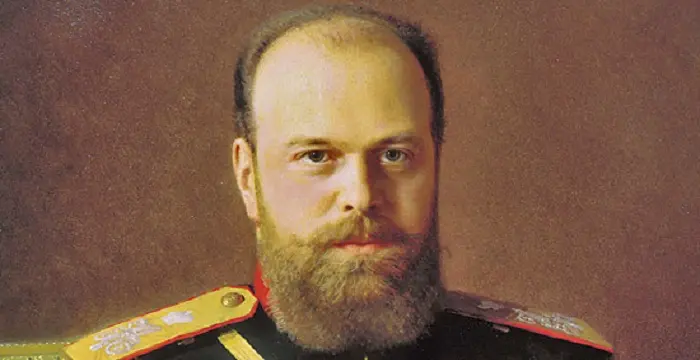
Alexander III of Russia - Kings, Life Achievements and Facts
Alexander III of Russia's Personal Details
Alexander III of Russia was the emperor of Russia from 1881 to 1894, dubbed "The Peacemaker"
| Information | Detail |
|---|---|
| Birthday | March 10, 1845 |
| Died on | November 1, 1894 |
| Nationality | Russian |
| Famous | Historical Personalities, Emperors & Kings, Leaders, Emperors, Former Emperor of all Russia, Kings |
| Spouses | Maria Feodorovna |
| Siblings | Grand Duchess Alexandra Alexandrovna of Russia, Grand Duchess Maria Alexandrovna of Russia, Grand Duke Alexei Alexandrovich of Russia, Grand Duke Paul Alexandrovich of Russia, Grand Duke Sergei Alexandrovich of Russia, Grand Duke Vladimir Alexandrovich of Russia, Nicholas Alexandrovich, Tsarevich of Russia |
| Known as | Alexander III |
| Childrens | Grand Duchess Olga Alexandrovna of Russia, Grand Duchess Xenia Alexandrovna of Russia, Grand Duke Alexander Alexandrovich of Russia, Grand Duke George Alexandrovich of Russia, Grand Duke Michael Alexandrovich of Russia, Nicholas II of Russia |
| Birth Place | Saint Petersburg |
| Religion | Russian Orthodox Church, Eastern Christianity |
| Height | 190 |
| Gender | Male |
| Father | Alexander II of Russia |
| Mother | Maria Alexandrovna |
| Sun Sign | Pisces |
| Born in | Saint Petersburg |
| Famous as | Former Emperor of All Russia |
| Died at Age | 49 |
Alexander III of Russia's photo
Who is Alexander III of Russia?
Alexander III of Russia was the emperor of Russia from 1881 to 1894. He was known to be highly conservative and a staunch supporter of Russian nationalism. Upon succeeding the throne on the death of his father, Emperor Alexander II of Russia, he reversed some of the liberal reforms his father had implemented during his reign. His father had been a soft-hearted, liberal ruler and Alexander III was nothing like him in disposition. Lacking the sophistication and refinement generally associated with men of royal lineage, Alexander III prided himself on being rough and unrefined. During his reign he adopted several repressive policies including the Russification of national minorities in the Russian Empire as well as persecution of the non-Orthodox religious groups. Born as the second son of the Emperor Alexander II of Russia, it was unlikely that he would succeed his father as the emperor. However, when his elder brother Nicolas—the heir apparent—died at a young age, Alexander became the heir apparent to succeed his father. Alexander III was not a popular ruler and several assassination attempts were made on his life. In spite of all his shortcomings, Russia fought no major wars during his reign and thus he was dubbed "The Peacemaker"
// Famous Kings
Sundiata Keita
Sundiata Keita was the founder of the Mali Empire in West Africa. This biography profiles his childhood, early life, struggles, founding of empire, rule, administration, achievements and also gives some fun facts.
Ashoka
Ashoka was the third emperor of the Mauryan Dynasty and ruled almost the entire Indian subcontinent. This biography profiles his childhood, life, reign, achievements and timeline
Murad IV
Murad IV was one of the mighty Sultans in the history of the Ottoman Empire. This biography profiles his childhood, family, accession, rule, administration and timeline.
Childhood & Early Life
He was born as Alexander Alexandrovich Romanov on 10 March 1845 at the Winter Palace in Saint Petersburg, Russian Empire, to Emperor Alexander II of Russia and his wife Maria Alexandrovna (Marie of Hesse). He had one elder brother, Nicolas.
Being the second son, it was believed that he had little prospect of succeeding the throne. While his brother Nicolas—the tsarevich or heir apparent—was groomed to be the future king, Alexander only received the training of an ordinary Grand Duke of that period.
In 1865, Nicolas died suddenly and Alexander became heir apparent (as Tsarevich). Then he started studying the principles of law and administration under Konstantin Pobedonostsev. His teacher instilled in the young man a zeal for Russian Orthodox thought which would influence many of his decisions once he became the emperor.
Even though he did not play an important role in the public life as the heir apparent, he made it clear to his father that many of his own beliefs did not coincide with the principles of the existing government.
Ascension & Reign
Alexander’s father, Emperor Alexander II of Russia, was assassinated on 1 March 1881 and as a result he ascended to the Russian imperial throne as Alexander III of Russia.
Upon assuming his position as the emperor he began reversing several of the policies that his liberal minded father had implemented. He wanted the country to remain true to Russian Orthodoxy, Autocracy, and Nationality, and took drastic steps to prevent revolutionary agitations.
He proved himself to be an autocratic ruler who prided himself on being a true Russian patriot. He wanted to create a nation that was composed of a single nationality, language, and religion, as well as one form of administration.
In order to achieve this goal, he implemented a stringent policy of Russification of national minorities. He imposed the Russian language and Russian schools on his German, Polish, and Finnish subjects, and gave orders for persecuting the Jews and destroying the German, Polish, and Swedish institutions in the Russian provinces.
He was an unsympathetic ruler though it cannot be denied that the industrial development in Russia increased during his reign. He encouraged trade and commerce and took steps to revive Russia’s economy which had suffered a major setback after the Russian-Turkish war of 1877–1878.
Alexander III was known to be a man of peace when it came to foreign relations with other nations. He believed that the best way to avoid war was to be well prepared for it, and thus focused on strengthening Russia’s military power. His reign saw no major wars being fought by Russia.
Major Works
Alexander III of Russia is best remembered as a man of peace. During the years of his reign Russia was not involved in even a single major war. Because of his love for maintaining peaceful foreign relations, he earned the moniker, "The Peacemaker".
Awards & Achievements
He was the recipient of several honors including Supreme Order of the Most Holy Annunciation from the Kingdom of Italy (1865), French Légion d'Honneur (1865), Order of the Golden Fleece from Spain (1865), Order of the Southern Cross from the Empire of Brazil (1866), and Order of St. Stephen of Hungary (1866).
Personal Life & Legacy
As a young man he was madly in love with his mother's lady-in-waiting, Princess Maria Elimovna Meshcherskaya and wanted to marry her. However when his brother Nicolas was in his deathbed, he asked Alexander to marry his fiancée, Princess Dagmar of Denmark.
Bound by duty, he left his lady-love and married Princess Dagmar of Denmark (later known as Maria Feodorovna) in 1866 in the Imperial Chapel of the Winter Palace in St. Petersburg. The marriage proved to be a happy one and produced six children of whom five survived to adulthood.
Alexander III became ill with incurable kidney disease in early 1894 and died on 1 November 1894, at the age 6f 49. He was succeeded by his eldest son who took the throne as Nicholas II.
// Famous Emperors
Sundiata Keita
Sundiata Keita was the founder of the Mali Empire in West Africa. This biography profiles his childhood, early life, struggles, founding of empire, rule, administration, achievements and also gives some fun facts.
Ashoka
Ashoka was the third emperor of the Mauryan Dynasty and ruled almost the entire Indian subcontinent. This biography profiles his childhood, life, reign, achievements and timeline
Murad IV
Murad IV was one of the mighty Sultans in the history of the Ottoman Empire. This biography profiles his childhood, family, accession, rule, administration and timeline.
Alexander III of Russia biography timelines
- // 10th Mar 1845He was born as Alexander Alexandrovich Romanov on 10 March 1845 at the Winter Palace in Saint Petersburg, Russian Empire, to Emperor Alexander II of Russia and his wife Maria Alexandrovna (Marie of Hesse). He had one elder brother, Nicolas.
- // 1865In 1865, Nicolas died suddenly and Alexander became heir apparent (as Tsarevich). Then he started studying the principles of law and administration under Konstantin Pobedonostsev. His teacher instilled in the young man a zeal for Russian Orthodox thought which would influence many of his decisions once he became the emperor.
- // 1865 To 1866He was the recipient of several honors including Supreme Order of the Most Holy Annunciation from the Kingdom of Italy (1865), French Légion d'Honneur (1865), Order of the Golden Fleece from Spain (1865), Order of the Southern Cross from the Empire of Brazil (1866), and Order of St. Stephen of Hungary (1866).
- // 1866Bound by duty, he left his lady-love and married Princess Dagmar of Denmark (later known as Maria Feodorovna) in 1866 in the Imperial Chapel of the Winter Palace in St. Petersburg. The marriage proved to be a happy one and produced six children of whom five survived to adulthood.
- // 1877 To 1878He was an unsympathetic ruler though it cannot be denied that the industrial development in Russia increased during his reign. He encouraged trade and commerce and took steps to revive Russia’s economy which had suffered a major setback after the Russian-Turkish war of 1877–1878.
- // 1st Mar 1881Alexander’s father, Emperor Alexander II of Russia, was assassinated on 1 March 1881 and as a result he ascended to the Russian imperial throne as Alexander III of Russia.
- // 1st Nov 1894Alexander III became ill with incurable kidney disease in early 1894 and died on 1 November 1894, at the age 6f 49. He was succeeded by his eldest son who took the throne as Nicholas II.
// Famous Emperors & Kings
Sundiata Keita
Sundiata Keita was the founder of the Mali Empire in West Africa. This biography profiles his childhood, early life, struggles, founding of empire, rule, administration, achievements and also gives some fun facts.
Ashoka
Ashoka was the third emperor of the Mauryan Dynasty and ruled almost the entire Indian subcontinent. This biography profiles his childhood, life, reign, achievements and timeline
Murad IV
Murad IV was one of the mighty Sultans in the history of the Ottoman Empire. This biography profiles his childhood, family, accession, rule, administration and timeline.
Xerxes I
Xerxes I (Xerxes the Great) was the fourth and the most famous king of the Archaemenid dynasty of Persia. This biography profiles his childhood, family, personal life, life history, achievements, campaigns, administration, death and other facts.
Sargon of Akkad
Sargon of Akkad, also called ‘Sargon the Great’, ‘Sarru-Kan’ and ‘Shar-Gani-Sharri’, was the founder and first king of the Akkadian Empire. This biography profiles his childhood, life, rule, administration, timeline, and gives some fun facts.
Abdullah of Saudi Arabia
Abdullah bin Abdulaziz Al Saud was the King of Saudi Arabia from 2005 to 2015 and the third wealthiest head of state in the world. Find more facts about his life, childhood and timeline.
Alexander III of Russia's FAQ
What is Alexander III of Russia birthday?
Alexander III of Russia was born at 1845-03-10
When was Alexander III of Russia died?
Alexander III of Russia was died at 1894-11-01
Where was Alexander III of Russia died?
Alexander III of Russia was died in Livadiya, Crimea
Which age was Alexander III of Russia died?
Alexander III of Russia was died at age 49
Where is Alexander III of Russia's birth place?
Alexander III of Russia was born in Saint Petersburg
What is Alexander III of Russia nationalities?
Alexander III of Russia's nationalities is Russian
Who is Alexander III of Russia spouses?
Alexander III of Russia's spouses is Maria Feodorovna
Who is Alexander III of Russia siblings?
Alexander III of Russia's siblings is Grand Duchess Alexandra Alexandrovna of Russia, Grand Duchess Maria Alexandrovna of Russia, Grand Duke Alexei Alexandrovich of Russia, Grand Duke Paul Alexandrovich of Russia, Grand Duke Sergei Alexandrovich of Russia, Grand Duke Vladimir Alexandrovich of Russia, Nicholas Alexandrovich, Tsarevich of Russia
Who is Alexander III of Russia childrens?
Alexander III of Russia's childrens is Grand Duchess Olga Alexandrovna of Russia, Grand Duchess Xenia Alexandrovna of Russia, Grand Duke Alexander Alexandrovich of Russia, Grand Duke George Alexandrovich of Russia, Grand Duke Michael Alexandrovich of Russia, Nicholas II of Russia
What is Alexander III of Russia's religion?
Alexander III of Russia's religion is Russian Orthodox Church, Eastern Christianity
How tall is Alexander III of Russia?
Alexander III of Russia's height is 190
Who is Alexander III of Russia's father?
Alexander III of Russia's father is Alexander II of Russia
Who is Alexander III of Russia's mother?
Alexander III of Russia's mother is Maria Alexandrovna
What is Alexander III of Russia's sun sign?
Alexander III of Russia is Pisces
How famous is Alexander III of Russia?
Alexander III of Russia is famouse as Former Emperor of All Russia
